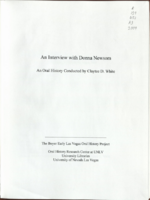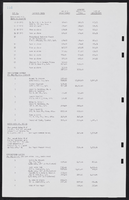Search the Special Collections and Archives Portal
Search Results
Sandra Blake Toles oral history interviews
Identifier
Abstract
Oral history interviews with Sandra Blake Toles conducted by Claytee D. White on November 13, 2018 and November 28, 2018 for the African Americans in Las Vegas: a Collaborative Oral History Project. In the first interview, Toles discusses her early life in Enid, Oklahoma and growing up in a family of ten children. She talks about her father being an ordained bishop in the Pentecostal Church, the significance of religion in her family, and the religious community she grew up in. Toles remembers her husband’s service in the United States Air Force, being stationed at Nellis Air force Base in 1966, and purchasing their first home in Las Vegas, Nevada. Later, Toles describes the Westside community during the 1970s, and her involvement with the Las Vegas City government. In the final interview, Toles discusses local initiative programs that work towards alleviating crime, assist mothers on welfare, housing assistance, and develop employment training and opportunities for community members.
Archival Collection
Mozella Sheds Scott oral history interview
Identifier
Abstract
Oral history interview with Mozella Sheds Scott conducted by Claytee D. White on November 30, 2010 for the Boyer Early Las Vegas Oral History Project. Scott discusses her childhood in Friars Point, Mississippi, and aspects of rural life. She then described moving to Las Vegas, Nevada in 1965 and taking a job as a laundry presser and distributor. Scott compares life in Mississippi to the Westside of Las Vegas, describing the Bonanza Village area, employment of the black population, and churches in the area. She also discusses her employment while attending Nevada Southern University, now University of Nevada, Las Vegas, as well as her first position in education and libraries. Additionally, Scott discusses racial discrimination her husband faced in his job at a titanium plant. She concludes by describing her work to improve literacy and education in her community with organizations including, Upward Bound, Community Adult Learning in Libraries (CALL), Parent-In-Charge, and Word on a Rock.
Archival Collection

Transcript of interview with Alice Thiriot Waite by Carole Terry and Donna Andress, October 19, 2011
Date
Archival Collection
Description
The memories and recollections of Alice Thiriot Ballard Waite provide a most interesting look at both at the Junior League of Las Vegas in the 1970s and the early days of Las Vegas. Alice recalls her childhood and young adult years after she arrived in Las Vegas at the age of five, giving the reader a rare picture of Las Vegas in the 1950s and 1960s. She was most active in the volunteer community of Las Vegas and served as Junior League President in 1964-5. Her reminiscences about the events and activities during the years while she was a Junior League member are an invaluable insight into its history. The exhibits she is sharing are an important documentation of those years after the Service League became the Junior League. She herself was a forerunner of today's Active members because she was a single, working mother while serving as the first "professional" President of the League.
Text

Transcript of interview with Charles and Anne Snavely by Lois Goodall, February 5, 2014 and January 8, 2015
Date
Archival Collection
Description
S. Charles Snavely, a long-time Las Vegas pediatrician, arrived in Nevada in 1965 with his wife, Ann, and two children courtesy of the United States Air Force. The family lived at Nellis Air Force Base while Charlie completed his Barry Plan commitment to the military. In separate interviews, Charlie and Ann discuss their arrival in Las Vegas, their first house in the Glen Heather area of Ward 1, and their current house in the Scotch 80s (pictured above). Charlie and Ann met at a small private hospital in Lebanon, Pennsylvania, where Ann was working as a nurse. The two University of Pennsylvania graduates, now married 63 years, raised their children in their Scotch 80s house and so far have not been tempted to move elsewhere.
Text

Transcript of interview with Bernice M. Johnson by Dan Buress, February 21, 1979
Date
Archival Collection
Description
On February 21, 1979, Dan Buress interviewed Bernice Johnson (born September 13, 1919 in Los Angeles, California) in her home in Las Vegas, Nevada. The two discuss Mrs. Johnson’s personal history and her reasons for moving to Las Vegas. Johnson describes moving between Southern California and Las Vegas while her husband worked for the railroad company. The interview concludes with Johnson recalling her memories of the Von Tobel family and the rapid population growth in Las Vegas after the construction of the Nevada Test Site.
Text

Transcript of interview with Sam Earl by Laura Button, March 9, 1981
Date
Archival Collection
Description
On March 9, 1981, Laura Button interviewed Sam Earl (born 1912 in Virgin, Utah) about his life in Nevada. Also present during the interview is Sam’s wife, Melissa Earl. The three discuss a wide range of topics from the early development of Las Vegas, Sam’s work on the Boulder Dam, the Earls’ early residence in a tent, and the family’s religious participation. The interview also covers gambling, Block 16, the first members of the police force, recreational activities, and the Helldorado parade. Sam also talks about his work as a building contractor, including some of the buildings and casino properties he helped build, and the interview moves to a discussion of the development of the Las Vegas Strip. The interview concludes with Sam’s description of his work as a truck driver and a discussion on welfare benefits.
Text

Transcript of interview with Donna Newsom by Claytee White, June 11, 2009
Date
Archival Collection
Description
Donna Newsom shares the history of her life in great detail, beginning with her childhood in Georgia and Florida. The family moved many times, following her father's work opportunities. Donna had a close relationship with her father and recalls the many daring adventures on which he took her. After graduating from high school, Donna earned a nursing degree at the Macon Hospital School of Nursing. She remembers dorm life, long hours, and the specific training nurses received in the late forties. Her career began at age 19 with a year of working at Macon Hospital as a graduate nurse, and then she made plans to leave the South. Donna's memories include moving to Houston, living in a boarding house, her first date, and working at Hermann Hospital and then Methodist Hospital. She then answered an ad to work at a Girl Scout camp in Colorado, and her roommate there became a mentor and one of her staunchest supporters. With help from her mentor, Donna went on to earn a teaching degree in Austin, Texas, met and married her husband Sam Newsom, and got involved in real estate. She relates the many experiences they had during Sam's Navy career, her teaching experience in New Orleans, and their eventual move to Las Vegas. Sam and Donna loved Las Vegas from the moment they moved here. She recalls many details of her employment at UMC, the differences in health care compared to down south, and the feeling of being safe no matter the time of day or night. Donna stays active in tutoring, the OLLI program at UNLV, and working for the Salvation Army women's auxiliary. She and Sam also get together with his golfing buddies and their wives for dinners in their various homes.
Text

Chart of coolers and recirculation pumps (Las Vegas), 1950
Date
Archival Collection
Description
List of coolers and how many are equipped with recirculation pumps broken down by subdivision in Las Vegas
Text

Transcript of interview with Marie Jordan by Edward Gentry, February 27, 1981
Date
Archival Collection
Description
On February 27, 1981, Edward Gentry interviewed Marie Jordan in her home in Las Vegas, Nevada. The two discuss social differences between Arizona and Las Vegas, particularly in the ways schools were segregated in Las Vegas. Jordan also discusses the “Whites Only” policy on the Strip and Downtown. The interview concludes with Jordan sharing her views on the importance of helping others.
Text

